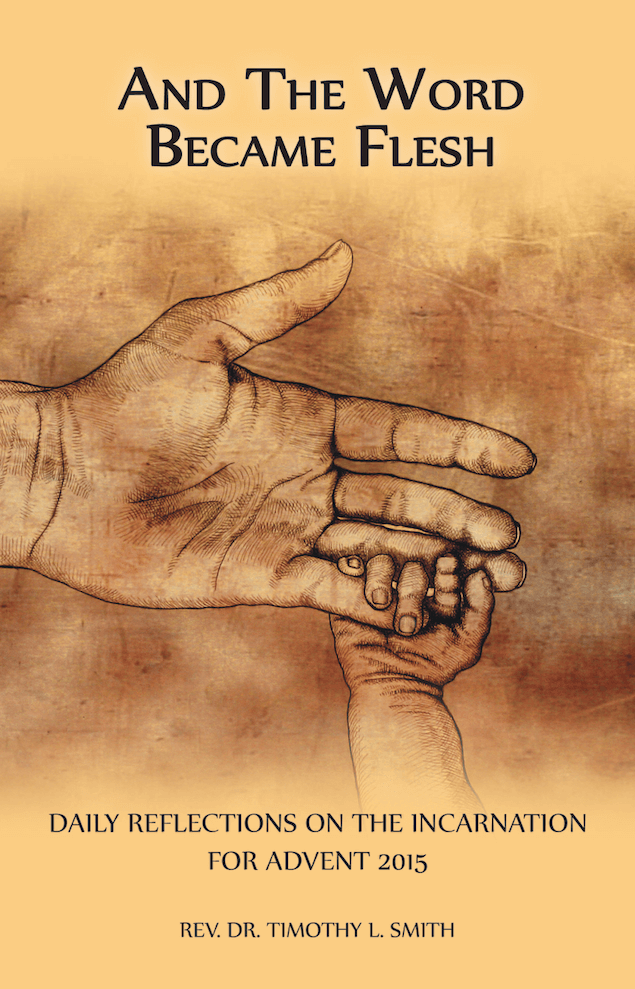THE FIRST SUNDAY OF ADVENT

The light shines in the darkness, and the darkness did not overcome it…
And the Word became flesh and lived among us, and we have seen
his glory, the glory as of a father’s only son, full of grace and truth.
John 1:1-5, 14
In the old Broadway play “Green Pastures” Pulitzer Prize winning playwright Marc Connelly tells Bible stories as they might be seen through the eyes of an African-American child during the Great Depression. There is one particularly memorable scene in which the Lord God is looking out over heaven’s parapets pondering what to do about His ornery people below. Then from stage right angel Gabriel enters, horn tucked under his arm, moistening his lips, ready to sound the trumpet.
“No, no,” says the Lord putting his hand out to stop the angel. “Not yet, Gabriel, put your trumpet away.” Gabriel then asks the Lord what He is going to do about His troublesome kids. Will He send down David or Moses to take things in hand? Will the Lord send them a prophet? “We have lots of good prophets up here, you know, Lord.” The Lord pauses, looks Gabriel in the eye and says, “I’m not going to send anyone. This time I’m going down myself.”
And that’s just what God does at Christmas! God goes Himself. The eternal Creator and Sovereign of the universe comes down to us, clothing Himself in our very humanity, that He might clothe us in His life and glory.
Each of the four Gospels begins with the story of Jesus. Matthew and Luke begin with Jesus as a baby at Bethlehem. Mark begins with Jesus at the River Jordan being baptized, identifying Himself with sinners. But John begins his story beyond time and history — at the beginning. He wants us to read Christmas in the light of eternity as He declares Jesus to be the eternal God, the Word.
There is an important reason John uses the word “Word” (Logos) to proclaim Jesus as God of heaven and earth: “Word” was a title for God in the first century world. For the Greeks The Word was the rational, logical principle permeating and guiding all that exists (compare our word “logic” derived from the Greek Logos). As well, the Hebrews frequently spoke of God as the Word (Memra). “To the Hebrew ‘the word of God’ was the self-assertion of the divine personality; to the Greek the formula denoted the rational mind that ruled the universe.” (Merrill Tenney, “John”, in John-Acts: The Expositor’s Bible Commentary)
John introduces Jesus as the Word because it is a term communicating the reality that Jesus gives purpose, guidance, and logic to all creation; Jesus is the ultimate self-expression of God to humanity. Charles Williams, theologian, poet, playwright, and friend of C. S. Lewis and J. R. R. Tolkien, captures the essence of what Jesus as the Word, or Logos, meant to John’s first century readers:
To the Greeks the ‘logos’ was the purpose or meaning of existence. To the Jews the ‘logos’ was God’s Word – the truth or moral absolutes at the foundation of all reality…He tells Jews that the truth and self-expression of God has become human. He tells Greeks that the meaning of life and all existence has become human.”(Charles Williams, quoted by Timothy Keller in Gospel Christianity, Course 1)
God didn’t send some prophet or angel to help us. He came Himself to give meaning and purpose to our lives. He came to share in our ruin and alienation so that we might forever share in His life and glory!
PONDERINGS
- Take a moment to imagine God as the Logos, the rational principle that guides and gives purpose to all that exists. What does this mean for your everyday life?
- Ponder the Logos as Creator and Sustainer of a universe of billions of galaxies like our Milky Way.
- Now imagine the Logos come down to a stable, stinking of urine, dung, and cattle. The Logos is made absolutely dependent on Mary to feed Him, change His diapers, and burp Him. What thoughts and what feelings stir within as you ponder the Logos come to earth? What do you want to say to Him?
EMBODIED PRAYER: STANDING
The most common prayer position in the Old and New Testaments was standing with eyes open looking upward, and raising arms with open hands. It is a prayer position practiced by the Lord Jesus (Luke 9:28-32; John 17:1). Ancient Jews called this position the Amidah (“standing prayer”); early Christians knew it as the Orans (“praying”) position. This standing prayer is seen on wall drawings in the catacombs in Rome, and is the posture recommended by early Christian theologians and Church Fathers.
Just as we stand to express respect and awe in our culture, so we stand to embody our respect and wonder at God’s majesty and greatness. We raise open hands towards Him ready to receive, and open our eyes towards Him as the source of all life and goodness.
Today and every day of this first week of Advent, pray the Lord’s Prayer:
- Standing
- Open hands raised towards heaven
- Open eyes looking expectantly to God



